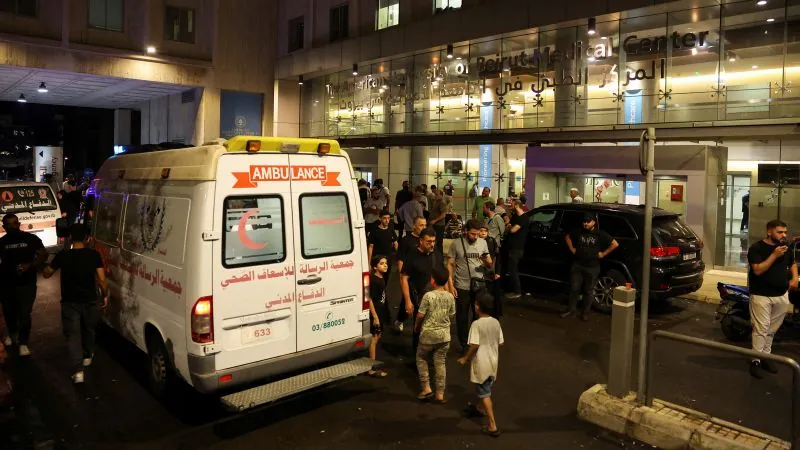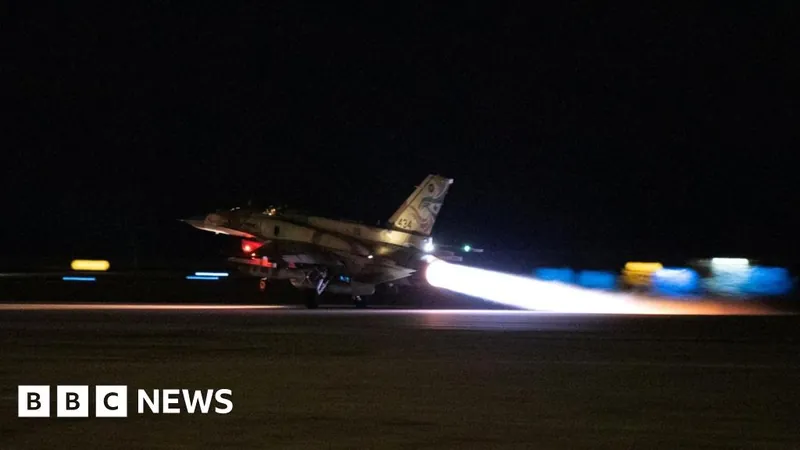
Explosive Developments: Israel Strikes Hezbollah via Pager Bombs, Tensions Soar in Lebanon
2024-09-18
Live Updates: Claims of Israeli Involvement in Pager Explosions Rock Lebanon
In a shocking and unprecedented incident, explosions triggered by pagers used by Hezbollah members swept across Lebanon on Tuesday, resulting in the deaths of nine individuals, including an 8-year-old girl, and injuries to nearly 3,000 others. The aftermath has left the country reeling and Hezbollah vowing retaliation against Israel.
Eyewitness accounts from outside the American University of Beirut Medical Center depict scenes of chaos as the wounded flooded into hospitals. One witness recounted seeing a distraught young man waiting for news about his friend, who is undergoing surgery hoping to save his eyesight after an explosion caused profound injuries.
The shocking series of blasts has illuminated Hezbollah's vulnerability and exposed the group’s once-hidden operational methods. Traditionally, Hezbollah has relied on secrecy, employing guerilla tactics honed during Israel's occupation of southern Lebanon. However, the recent attack—believed to be a coordinated operation involving Israel’s Mossad intelligence and military forces—successfully turned thousands of benign pagers into lethal instruments of warfare.
Not only did the explosions shatter lives, but they also compromised Hezbollah’s operational integrity, as the group has long maintained a "state within a state" status, providing social services while mobilizing significant military might. Experts now warn that this incident could escalate ongoing tensions in the region, which have already significantly intensified due to the recent conflict between Israel and Hamas.
Iran has condemned the explosions, labeling them a "terrorist act," and their ambassador to Lebanon was among those injured. Amidst rising diplomatic tensions, Iranian officials have asserted that the attack epitomizes Israel’s broader threat to regional stability.
The responsible party behind the pagers, a little-known Taiwanese manufacturer called Gold Apollo, has come under scrutiny as images from the blast sites surfaced, showing its devices. Founder Hsu Ching-kuang denied any involvement in the attack that utilized their products. Reports indicate that explosive charges were meticulously hidden within the pagers, allowing for remote detonation—a tactical maneuver indicating advanced planning.
Compounding the situation, hospitals in Lebanon are struggling to cope with a surge of injured patients, and critical case numbers continue to rise. Jordan has extended an offer to assist Lebanon’s medical facilities, indicating regional solidarity amidst growing chaos.
In the wake of these events, speculation is rampant about Hezbollah’s internal assessments and potential retaliatory measures. U.S. officials have asserted that they had no prior knowledge of the attack, underscoring the complexity and deceptive nature of the operation.
As geopolitical dynamics continue to shift, Lebanon finds itself precariously balancing on a tightrope of escalating military confrontations and a humanitarian crisis. With Hezbollah’s foundational principles now challenged, many are left wondering what the future holds for the region.
This alarming incident poses fundamental questions about the effectiveness of Hezbollah’s once-reliable secrecy, provoking fear among its members and prompting a thorough assessment of their operational security. As the Middle East bristles with uncertainty, the coming days will be crucial in determining if retaliation will lead to further conflict or a new phase of negotiations amidst this heightened state of alert.




 Brasil (PT)
Brasil (PT)
 Canada (EN)
Canada (EN)
 Chile (ES)
Chile (ES)
 España (ES)
España (ES)
 France (FR)
France (FR)
 Hong Kong (EN)
Hong Kong (EN)
 Italia (IT)
Italia (IT)
 日本 (JA)
日本 (JA)
 Magyarország (HU)
Magyarország (HU)
 Norge (NO)
Norge (NO)
 Polska (PL)
Polska (PL)
 Schweiz (DE)
Schweiz (DE)
 Singapore (EN)
Singapore (EN)
 Sverige (SV)
Sverige (SV)
 Suomi (FI)
Suomi (FI)
 Türkiye (TR)
Türkiye (TR)